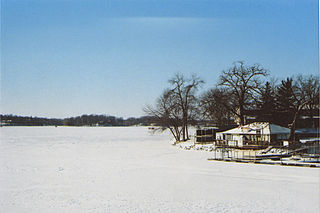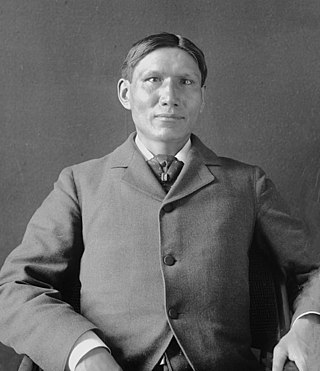
Native American gaming comprises casinos, bingo halls, and other gambling operations on Indian reservations or other tribal lands in the United States. Because these areas have tribal sovereignty, states have limited ability to forbid gambling there, as codified by the Indian Gaming Regulatory Act of 1988. As of 2011, there were 460 gambling operations run by 240 tribes, with a total annual revenue of $27 billion.

Scott County is a county in the U.S. state of Minnesota. As of the 2020 census, the population was 150,928. Its county seat is Shakopee. Shakopee is also the largest city in Scott County, the twenty-third-largest city in Minnesota, and the sixteenth-largest Twin Cities suburb. The county was organized in 1853 and named in honor of General Winfield Scott. Scott County is part of the Minneapolis-St. Paul-Bloomington, MN-WI Metropolitan Statistical Area. It is a member of the Metropolitan Council, and shares many of the council's concerns about responsible growth management, advocating for progressive development concepts such as clustering, open-space design, and the preservation of open space and rural/agricultural land.

Prior Lake is an exurban city 20 miles (32 km) southwest of Minneapolis seated next to Savage and Shakopee in Scott County in the state of Minnesota. Surrounding the shores of Lower and Upper Prior Lake, the city lies south of the Minnesota River in an area known as RiverSouth and establishes the urban fringe of the south-southwest portion of Minneapolis-St. Paul, the sixteenth largest metropolitan area in the United States. The population of Prior Lake was 22,796 at the 2010 census.

The Lower Sioux Indian Community, also known as the Mdewakanton Tribal Reservation, is an Indian reservation located along the southern bank of the Minnesota River in Paxton and Sherman townships in Redwood County, Minnesota. Its administrative headquarters is two miles south of Morton. The reservation is located southeast of Redwood Falls, the county seat.

The Shakopee Mdewakanton Sioux Community (SMSC) is a federally recognized, sovereign Indian tribe of Mdewakanton Dakota people, located southwest of Minneapolis and Saint Paul, within parts of the cities of Prior Lake and Shakopee in Scott County, Minnesota. Mdewakanton, pronounced Mid-ah-wah-kah-ton, means "dwellers at the spirit waters."
The Minnesota Indian Affairs Council (MIAC) is a state-level government agency created by the Minnesota Legislature in 1963 to provide a liaison between the government of Minnesota and the American Indian tribes in the state. The council also brings issues of concern to Indians living in urban areas to the attention of the state government. It was the first state-level Indian affairs agency to be established in the United States.

Canterbury Park, is a horse racing track in Shakopee, Minnesota, United States. Canterbury Park Holding Corporation hosts parimutuel wagering on live thoroughbred and quarter horse racing at its facilities in Shakopee and parimutuel wagering on races held at out-of-state racetracks that are simulcast to the racetrack. In addition, the Canterbury Park Card Casino operates 24 hours a day, seven days a week and is also regulated by the Minnesota Racing Commission. Casino games include blackjack, baccarat, Ultimate Texas Hold 'Em and poker. Canterbury Park also derives revenue from related services and activities, such as concessions, parking, admissions and programs, and from other entertainment events held at the racetrack. Furthermore, Canterbury Park is pursuing a strategy to enhance shareholder value by developing approximately 140 acres of underutilized land surrounding the racetrack in a project known as Canterbury Commons. The company is pursuing several mixed-use development opportunities for the underutilized land, directly and through joint ventures.
The Mdewakanton or Mdewakantonwan are one of the sub-tribes of the Isanti (Santee) Dakota (Sioux). Their historic home is Mille Lacs Lake in central Minnesota. Together with the Wahpekute, they form the so-called Upper Council of the Dakota or Santee Sioux. Today their descendants are members of federally recognized tribes in Minnesota, South Dakota and Nebraska of the United States, and First Nations in Manitoba, Canada.

The Crow Creek Indian Reservation, home to Crow Creek Sioux Tribe is located in parts of Buffalo, Hughes, and Hyde counties on the east bank of the Missouri River in central South Dakota in the United States. It has a land area of 421.658 square miles (1,092.09 km2) and a 2000 census population of 2,225 persons. The major town and capital of the federally recognized Crow Creek Sioux Tribe is Fort Thompson.

The Dakota are a Native American tribe and First Nations band government in North America. They compose two of the three main subcultures of the Sioux people, and are typically divided into the Eastern Dakota and the Western Dakota.

Shakopee is a city in and the county seat of Scott County, Minnesota, United States. It is located southwest of Minneapolis. Sited on the south bank bend of the Minnesota River, Shakopee and nearby suburbs comprise the southwest portion of Minneapolis-Saint Paul, the sixteenth-largest metropolitan area in the United States, with 3.7 million people. The population was 43,698 at the 2020 census.
KABU is a radio station licensed to serve Fort Totten, North Dakota. The station is owned by Dakota Circle Tipi, Inc. It airs a Variety format. KABU serves the Spirit Lake Nation of the Dakota tribe in northern North Dakota.
Shakopee or Chief Shakopee may refer to one of at least three Mdewakanton Dakota leaders who lived in the area that became Minnesota from the late 18th century through 1865. The name comes from the Dakota Śakpe meaning "Six." According to tribal histories, the very first "Shakpe" was called that because he was the sixth child of a set of sextuplets.

The Flandreau Indian Reservation is an Indian reservation, belonging to the federally recognized Flandreau Santee Sioux Tribe of South Dakota. They are Santee Dakota people, part of the Sioux tribe of Native Americans. The reservation is located in Flandreau Township in central Moody County in eastern South Dakota, near the city of Flandreau.
Stanley R. Crooks served as the Chairman of the Shakopee Mdewakanton Sioux Community of Minnesota from 1992 until his death in August 2012. Crooks became a national Native American leader during his twenty-year tenure. He served in the National Congress of American Indians, the longtime chairman of the Minnesota Indian Gaming Association, and the representative of the Shakopee Mdewakanton to the National Indian Gaming Association.
Norman Melvan Crooks was an American tribal leader who served as the first Chairman of the Shakopee Mdewakanton Sioux Community of Minnesota. Crooks' son, the late Stanley Crooks, later served as chairman of the community from 1992 until 2012.
Charlie Vig is the former Chairman of the Shakopee Mdewakanton Sioux Community of Minnesota. Vig served as the Vice Chairman from January 2012 until August 2012. He then served as Chairman from August 2012 to January 2020. The Shakopee Mdewakanton Sioux Community is the most influential Native American tribe in Minnesota and the single-largest benefactor for Indian Country nationally.
Mystic Lake Casino Hotel is owned and operated by the Shakopee Mdewakanton Sioux Community (SMSC) in Prior Lake, Minnesota, United States, southwest of Minneapolis and Saint Paul. With 4,100 employees, the SMSC – including Mystic Lake Casino Hotel and Little Six Casino – is the largest employer in Scott County. The casino's gambling options include slots, bingo, video roulette, pulltabs, and live dealer blackjack. Mystic Lake also offers bars, restaurants, shows, special events, and accommodations.
The Native Mob is a Native American street gang. The Native Mob is one of the largest and most violent Native American gangs in the U.S. and is notoriously active in Minnesota, Wisconsin, and South Dakota. The gang was created in the 1990s in Minneapolis, Minnesota to control drug turf, and has since established itself in prisons, and was estimated (2015) to have around 1,500 members.











